As most of the food is cooked at high temperatures, Ghee has a high smoke point, so cooking becomes easier. Ghee is the most stable alternative over oil for baking, frying, roasting in a better way. It is more helpful for dieters.
When we talk about durability, desi ghee with an opened jar can be usable for three months. For more durability, you can store it in the refrigerator, as it has no additives in homemade desi ghee and can be used for a year also. It enhances both physical and mental health, also detoxifying the whole body.
Also, it is efficient in providing better eyesight. Ghee, if consumed in a moderate amount then it works as a health booster in terms of digestion and weight loss. And ghee has properties such that it avoids the risk of many diseases.
Ghee is a type of clarified butter, whereas oil is a viscous, neutral and non-polar chemical substance. The difference between the two food items is based on their ingredients, method of preparation and uses.
In South Asian and Middle Eastern cuisines a meal without ghee is considered incomplete, whereas the same meal is considered tasteless, if not cooked in oil and mouth-watering spices.
Why ghee is the best alternative:
Ghee is rich in butyrate, it has properties against inflammation and gives good results on improvisation of the digestive system. The making process made it more tolerated in comparison with dairy sensitivity.
As we know the taste of ghee is very yummy, with the help of it you can make delicious recipes. Ghee is a rich source of vitamins like A, D, E, K. Consumption of one tablespoon of ghee gives around 15 per cent of your daily requirements of vitamin A. Ghee enriched with contents of conjugated linoleic acid improves insulin resistance and according to the study, avoid the risk of cancer.
Ghee is defined as a type of clarified butter. Ghee is prepared by simmering butter, which is churned from cream (traditionally made by churning yoghurt), skimming any impurities from the surface, and then pouring and retaining the clear, still liquid fat, while discarding the solid residue that settled on the bottom. Spices can be added for flavour.
The texture, colour, and taste of ghee depend on the quality of the butter, the source of the milk used in the process and the duration of the boiling.

Buy cow Ghee Online: Order Now. Free Shipping
Oil, on the other hand, is defined as any neutral, nonpolar chemical substance, which is a viscous liquid at ambient temperatures. It is made from plant, animal or synthetic fat. Oil is widely used for cooking, baking, and frying, etc.
This cooking oil is mainly produced in two separate processes. First, it is extracted from a seed, nut or fruit. Then, it undergoes refinement to alter the appearance, texture, smell, and taste.
Another difference is that ghee is salt-free, lactose-free and does not burn easily at high temperatures. On the other hand, oil consists of trans fats and a low smoke point, which helps it burn easily at low temperatures.
In terms of cooking, oil and ghee are widely used as condiments, spread or added to food to zing up the flavour. Though, in an Indian kitchen, everything from chapattis, curries, and dals is laced up in ghee, while oil is a widely used ingredient in salads, pasta and other baked dishes in the West. But, based on their flavour and nutrients, ghee is considered a healthier option than oil.
Comparison between Oil and Ghee:
| Oil | Ghee | |
| Definition | It is defined as any neutral, nonpolar chemical substance, which is a viscous liquid at ambient temperatures. | It is defined as a type of butter that has been clarified by boiling to the point of separation of the oil from the butter. |
| Made from | It is made from animal, plant or synthetic fat. | It is made from milk of animals. |
| Consists of | It contains:Mono-saturated fatsPoly-saturated fats andTrans fat | It contains:High anti-oxidantsVitamins A, D K, and E. |
| Burn | It burns easily as compared to ghee. | It does not burn easily as compared to oil. |
| Stability | It has a low stability as compared to ghee. | It has high stability as compared to oil. |
| Shell life | It has a low shell life, cannot be stored for long. | It has a high shelf life, and can be stored for long. |
Health Benefits Of Ghee
1. Ghee reduces your risk of heart disease.
Ghee is rich in conjugated linoleic acid, or CLA, a fatty acid that is considered protective against carcinogen, artery plaque, and diabetes. Desi cow ghee can potentially be used to help prevent cardiovascular diseases.
2. Good for the eyes.
Because ghee is rich in vitamin A, it is good for eyes. Vitamin A helps in adjusting the eyes to light shifts. In fact, moisture in the eyes depends on the presence of vitamin A in your body.
3. Nature provided moisturizer.
Ghee acts as a natural moisturizer. And we mean not only with superficial application. Our skin contains fat or phospholipids in the membrane. the essential fat found in ghee, you can ensure good skin health not only from the outside but also from the inside.
4. Rich in fat-soluble vitamins.
Ghee is rich in fat-soluble vitamins like Vitamin A, D, K and Vitamin E. The benefits of fat-soluble vitamins are:
- Vitamin A cellular development also helps in improving bone health along with healthy teeth.
- Vitamin D improves calcium absorption and can help prevent inflammation of the body.
- Vitamin E lesion enhances medical procedures and also helps in the immune system.
- Vitamin K helps to regulate blood-clotting activities
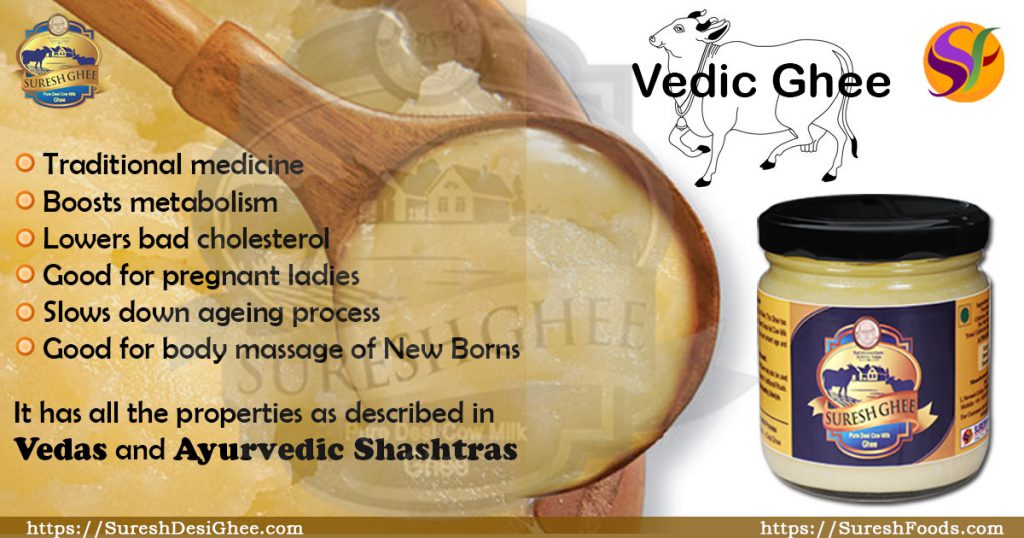
5. Improve Digestive Function
When we digest fibre, the awesome small bugs in our gut actually make the active ingredient in ghee – butyric acid – on their own. They use it to keep the intestine healthy, detoxified, and properly sealed, and they also gobble it up as a source of energy. Because of this, once we ingest desi ghee it’s in a familiar environment and our body knows exactly what to do with it.
Many people with leaky gut or other digestive issues have a severe lack of butyric acid – so supplementing with ghee is a great way to increase levels and improve digestion. Desi ghee also stimulates the release of gastric acid, supports healthy insulin levels, and encourages the generation of new (and the flushing out of oil) bile.
6. Maintain Healthy Weight + Boost Detoxification
Once ingested, the medium-chain fatty acids found in ghee aid burn the toxic/bad fats in our body by attracting stubborn fat-soluble toxins from our cells and helping to flush them out. This increased fat metabolism is good for those trying to shed pounds or maintain a healthy weight.
Also, it is important to note that consuming fat does not make you fat- it’s absolutely essential for a healthy body.
FAQ
When it comes down to deep-frying, selecting the appropriate oil is important. Ghee and mustard oil are both considered to be excellent options because of their high smoke points. Ghee possesses a smoke point of approximately 485°F (252°C), exceeding that of cooking oil, which stands at around 375°F (190°C).
Although, the choice among ghee and mustard oil depends on personal taste preferences and the particular dish you’re preparing. Ghee provides a rich, nutty flavor that can infuse fried foods with depth and intricacy, while cooking oil has a pungent, a little bitter taste that can be overwhelming if utilized in excess.
The health benefits of ghee and cooking oil are impacted by several factors, involving product quality, usage quantity, and complete dietary habits.
Ghee is a remarkable source of fat-soluble vitamins like A, D, E, and K2. It also consists of conjugated linoleic acid (CLA), a type of fatty acid related with potential health benefits such as inflammation reduction, improved insulin sensitivity, and support for weight loss. Irrespective, it’s beneficial to exercise moderation when utilizing ghee, as it is high in saturated fat, which, when consumed in excess, can increase the risk of heart disease. As such, it’s suggested to balance ghee consumption with further sources of healthy fats, like olive oil, nuts, and seeds.

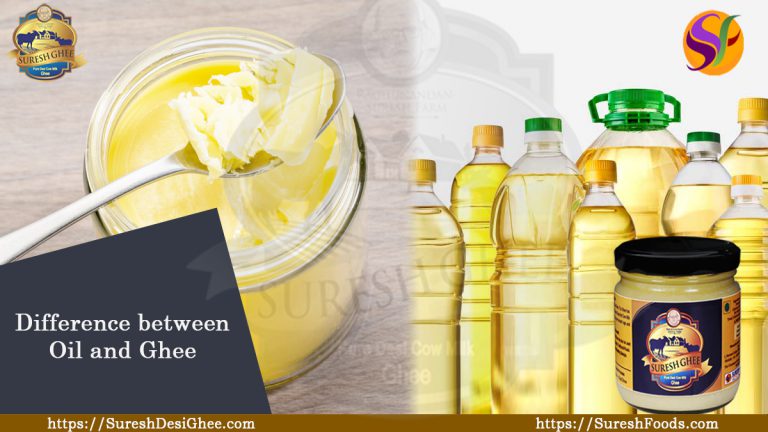

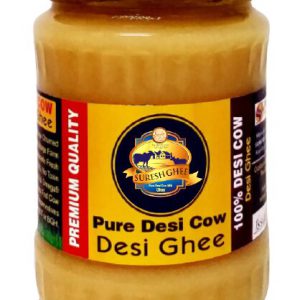
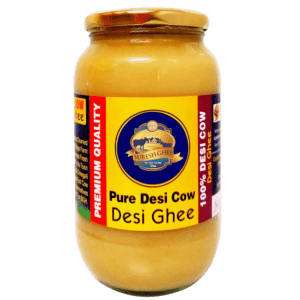
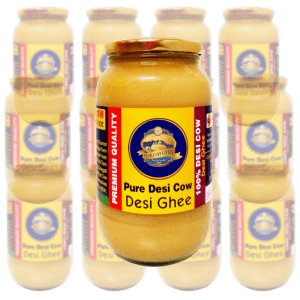
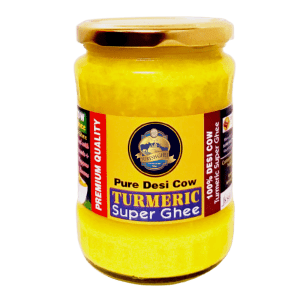
 WhatsApp us
WhatsApp us
Naveen m...